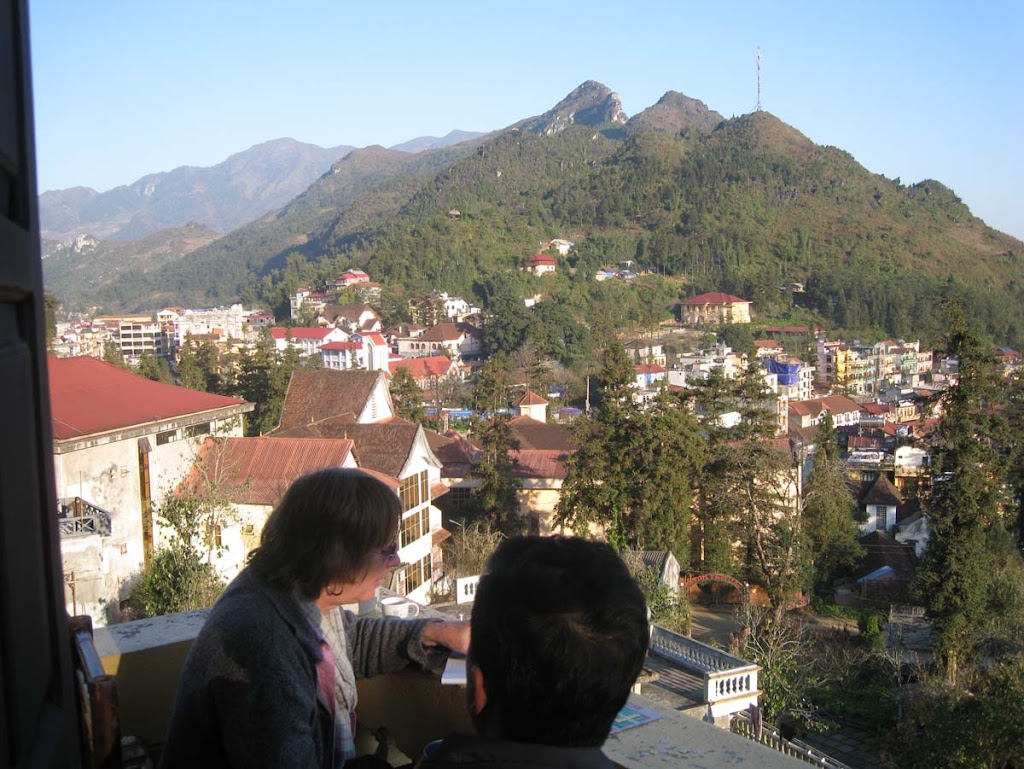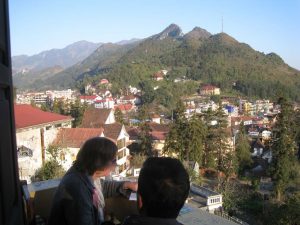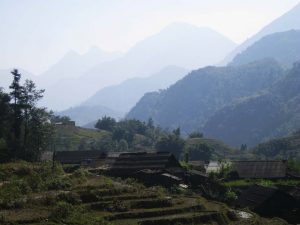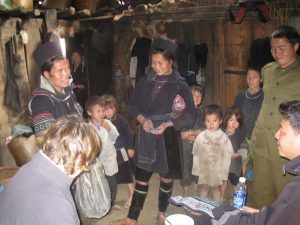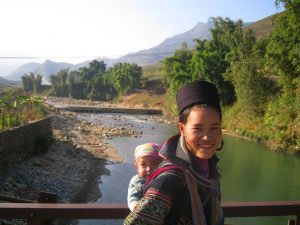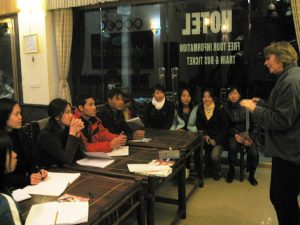Photos
- View from hotel
- Sin Chau village
- Sin Chau family house
- Song and her baby
- Hotel English class
Back to Sapa to check out our teaching permission papers which were not forthcoming in Banho. Our previous accomodation is full. We check into a £3.75 a night including breakfast hotel which has beautiful views of the mountains, balcony, a sofa and fresh flowers. I hope the Karaoke sign above the door is for decorative purposes only. The reading lamp explodes on second useage. The staff are charming. I have a heavy cold and the lady of the house insists on going out on her motorbike to get me special soup with medicinal herbs for breakfast. We achieved nothing in BanHo village so we plough on here- refocusing on Sapa and its environs as a potential volunteer environment. Colin suggests we see this week as a fact finding exercise rather than a teaching opportunity. Peter loves the mountains. The sun shines. We motorbike out to local hill-tribes in a nearby village, Sin Chau, which is more appealing, and less developed for tourism than BanHo. Would this beautiful misty mountain village, set within layer upon layer of rice terraces, offer a useful homestay to volunteers? We visit a family who are delightful but the possible accommodation (and I don’t mean to be rude) closely resembles an English coal bunker. I cannot see much detailed lesson planning going on here. This is the Black M’ong tribe- the women rarely leave the village- we are intrigued that all the building wood is black(not just smoke blackened.) Their home spun and woven garments are also black. We visit the local school, observe a lesson and arrange to speak to the headmaster. Yes! This makes sense. The classes are small (about 18) because many children in the tribes remain unschooled. The villages, although scantily self-sufficient, are poor. The children will need English to give them the option of employment in Sapa Town (debate here – stay rural, unschooled, high childhood mortality rates, or find employment in local tourist trade.) Phuong translates the discussion. The head is interested.. Year 6 would be best to start with. The project will need centralised government permission. We know we can do that – even if it takes time…next year..later volunteers.
Outside our hotel a tribal young mother with her baby hawks her family’s embroidery. She walks 5 miles a day through the mountains with her little girl on her back. Her name is Song. Her English, learnt from tourists, is surprisingly good. We pay her as a guide to accompany us to her home village, to talk about her schooling, the employment possibilities for young people, and what she hopes for her children. We tell her of our ideas for English teaching here and asks what she thinks of them.
Our ‘what are we doing here’ feeling seems to have transmorphed into ‘let’s try anything- at least we’ll learn something’ mode.
We ask the proprieter of the hotel if she knows of anyone who wants to learn English.
‘Ye’ lot
Can you get a group together for tomorrow night –up to ten people?
We could give 3 – 1 ½ hour lessons this week.
‘Ye’
‘We would like at least 3 people to be from ethnic minority groups, if possible
‘Ye’ We do i’ here in hotel. I get.
Peter invites yesterday’s motorbike driver for good measure. Let’s hope the Karaoke isn’t in full fling at the same time.
At 5 p.m.the next day the hotel lobby is rearranged. Phuong has bought a white board which we hang from the wall light. We wait. Eleven people turn up with a marvellous range of skills. We are amazed by the 24 hour turnaround turn out which includes 5 ethnic minority hill-tribe young women, some of them tour guides who have not been to school and do not read or write in any language, although their spoken English is very good. They say they want to learn to read and write. The couple who run the hotel –father does not speak a word of English, with their teenage niece. A man and a woman who work in local hotels, and the motorbike driver.
Peter leads the show. I’m his side kick.(despite the photo) A good time is had by all and I’m impressed by Peter’s calm delivery.
The next day myself and Phuong track down the government ministry of tourism to ask what English classes are already offered. There are free evening classes in the local school, but they have no native English speakers and would welcome volunteers. We visit the local secondary school and learn they find it is difficult to get competent English teachers here because jobs in tourism are more highly paid. A package of work based in Sapa for volunteers seems to be coming together.
